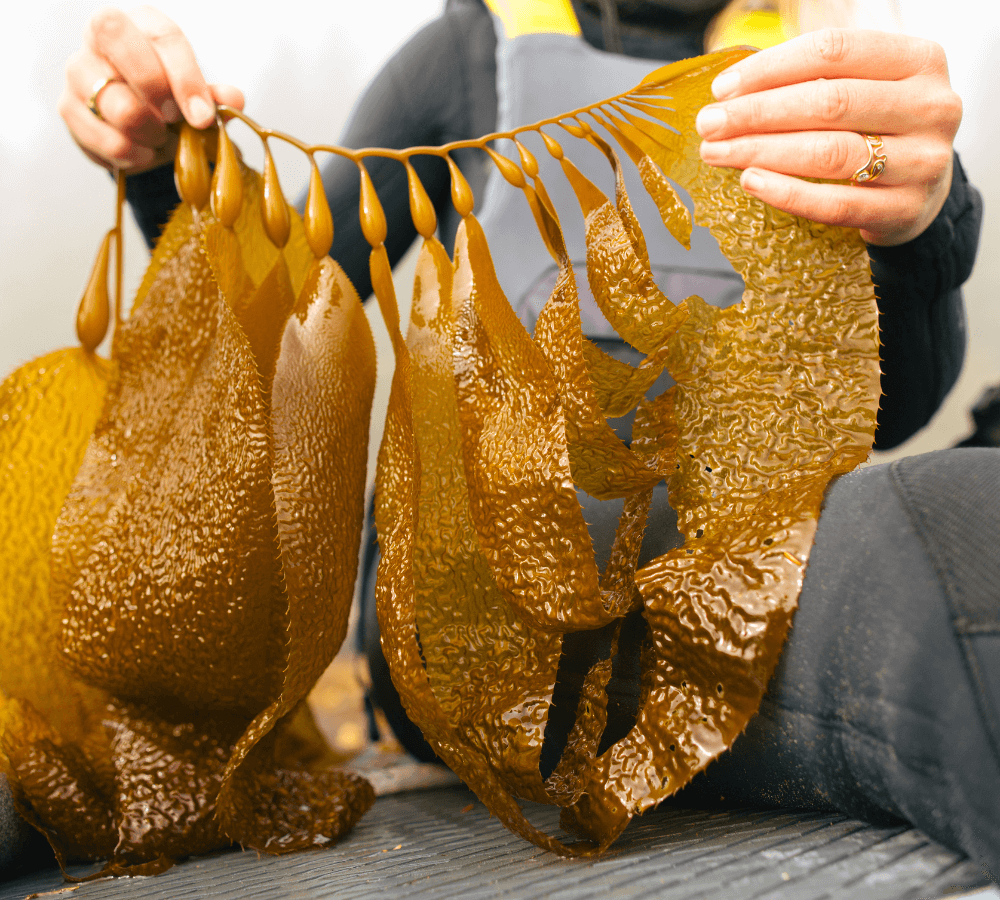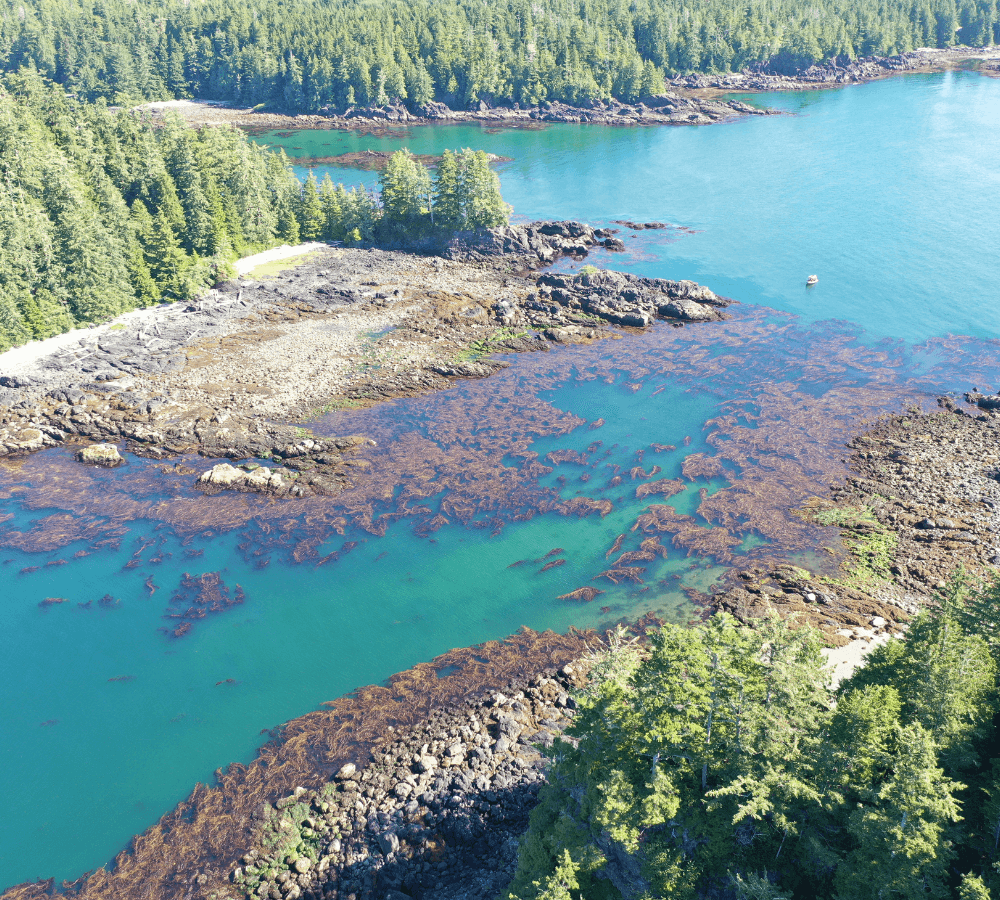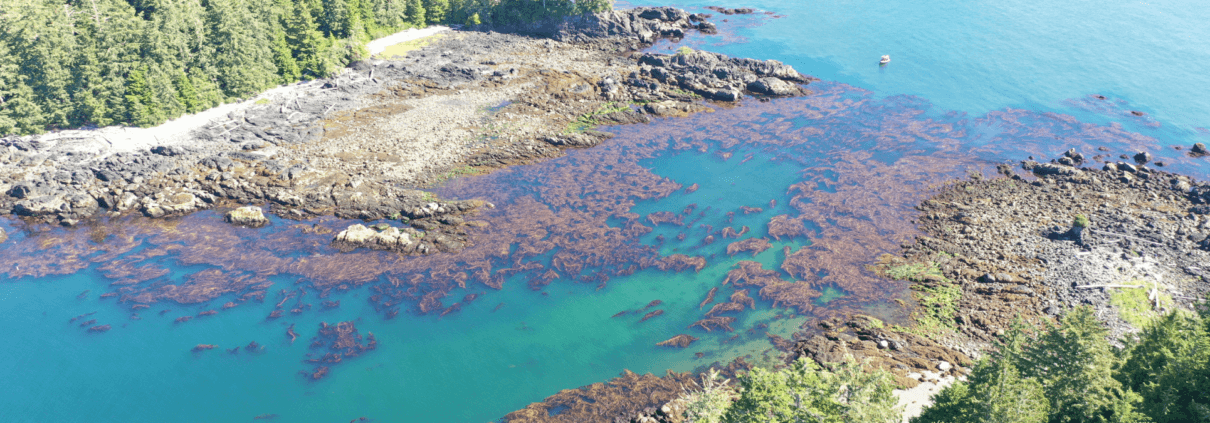Tackling kelp data gaps in Barkley and Clayoquot Sounds
This story originally appeared in the Winter 2023 edition of Salmon Steward, the Pacific Salmon Foundation’s quarterly print magazine.
Healthy kelp is essential to the well-being of Pacific salmon in B.C.
Every summer, millions of juvenile salmon rely on kelp beds to seek refuge from predation and forage for food before they brave the open ocean. Despite their invaluable role in marine ecosystems, there was very little baseline information available for kelp in Barkley and Clayoquot Sounds near Tofino – until now.
A multi-year kelp monitoring project by the Redd Fish Restoration Society, in partnership with the Toquaht and Yuułuʔiłʔatḥ Governments, and the Tla-o-qui-aht and Ahousaht First Nations, is helping bridge this data gap in the Barkley-Clayoquot region. The research centres around the health and distribution of kelp canopies, in hopes of better understanding these habitats and uncovering their role in juvenile salmon survival.
“Kelp forests are among the most productive ecosystems globally,” says Emily Fulton, marine coordinator at Redd Fish.
“The data collected from this project will help to inform decisions on future restoration activities, local economic opportunities, and the necessity for further research.”

Giant kelp (Macrocystis pyrifera). Photo: Graeme Owsianski
The state of kelp
While supporting thousands of species throughout the northeast Pacific, kelp also provides invaluable ecosystem services for humans, helping shield us from the increasingly intense storms ravaging our coastline.
Sadly, kelp along Vancouver Island’s west coast has long faced ecological pressures. Notably, the depletion of top predators like the sea otter has led to an imbalance in sea urchin populations – which can quickly devour kelp if left unchecked.
Climate change also comes into play by exacerbating seasonal temperature changes, impacting currents, and affecting nutrient flows. Researchers believe that climate impacts could lead to the further decline of kelp forest habitats.

Two Redd Fish employees measure bull kelp. Photo: Graeme Owsianski
Redd Fish first used drones to document the spatial extent of various kelp beds in 2021, and they have continued doing this every year. Working closely with partner nuučaanuł Nations, they identified primary sites for monitoring in Barkley and Clayoquot Sounds which contain both giant kelp and bull kelp. Researchers have now begun comparing annual survey data with machine learning software to identify trends in the distribution, density, and health of these ecosystems.
The next step? Incorporating environmental DNA (eDNA) collection to uncover clues about salmonid presence and documenting year-round oceanographic data to get a holistic picture of these ecosystems. PSF funding will help cover the costs of this data collection to shed light on future restoration priorities – including to help save salmon.
“Kelp forests foster the vitality of culturally and socioeconomically significant species like Pacific salmon,” says Fulton.
“Continuing to collect spatial data, oceanographic information, and eDNA samples will give insight into the health of these ecosystems and the nearshore marine environment as a whole. The ecosystem services that kelp yields are inestimable, warranting a serious commitment to long-term monitoring.”

An aerial view of a giant kelp bed in the Barkley Sound. Photo: Emily Fulton
About the Community Salmon Program
Every year, PSF grants up to $2 million to advance more than 200 community-led salmon conservation projects. From habitat restoration to invasive species removal and groundbreaking research, your support helps bring more boots on the ground for salmon.
The Community Salmon Program, launched 34 years ago, empowers volunteers and partners to act for salmon. The program accepts new applications for grants each spring and fall. Since 1989, PSF has engaged over 30,000 volunteers through 3,000 projects across B.C. and the Yukon. Learn more.



